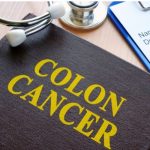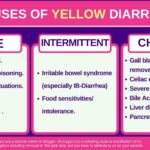4 Stool Changes in Stage 1 Colon Cancer (with Pictures).
Our content is not intended nor recommended as a substitute for medical advice by your doctor. Use for informational purposes only.
Stool changes can be one of the first signs of stage one colon cancer. Therefore, we will discuss the possible stool changes in the early stages of colon cancer.
The most common stool changes with stage one colon cancer are:
- Chronic or recurrent loose stools or diarrhea.
- Chronic or recurrent hard stools or constipation.
- Maroon bloody stools.
- Narrow (pencil-thin) stools.
- Also, many cases of early-stage colon cancer don’t notice any stool changes.
1. Loose or watery stools (diarrhea).
Recurrent or constant watery stool may be the first sign of stage one colon cancer.
At diagnosis, 75% of colorectal cancer patients present with bowel habit changes (either diarrhea or constipation).
Most people will experience loose stool. Severe watery diarrhea is found in about 17% of patients with colon cancer (reference).
The color of loose stool is often light brown or yellowish. However, the loose stool or diarrhea can be mixed with red or dark blood.
When does loose stool or diarrhea mean early (stage 1) colon cancer?
Loose stool or diarrhea are common early signs of stage one colon cancer. However, These changes in the stool are widespread and far from being a specific sign of colon cancer.
Not every loose (mushy) stool or diarrhea is a sign of early colorectal cancer (CRC). More than 99% of the cases of diarrhea are
So, when does diarrhea or loose stool mean colon cancer?
We suspect diarrhea as a symptom/sign of colon cancer when:
- The bowel habits changes are persistent or recurrent over relatively long periods (weeks or months).
- Associated risk factors.
- Associated with other colon cancer symptoms in women or men.
.
So, diarrhea or loose stool is not looked at separately; your doctor will suspect colorectal cancer if the loose stool is associated with other symptoms and risk factors for colorectal cancer.
Risk factors for colorectal cancer:
- Older ages (90% of the cases of colon cancer occur above the age of 50).
- Family history of colorectal cancer (especially in the young).
- Obesity.
- Having diabetes mellitus (the longer the duration of diabetes, the more the risk of colon cancer).
- Eating excess processed or red meat for many years.
- Tobacco smoking.
- Alcoholism.
- Sedentary lifestyle.
As gastroenterologists, we consider chronic or recurrent diarrhea after fifty to be a red flag sign.
Other symptoms & signs of colorectal cancer:
- Red or dark blood in the stool.
- A sense of rectal mass or incomplete stool evacuation.
- Abdominal pain.
- Progressive weight loss without trying.
- Progressive anorexia and nausea.
- Symptoms of anemia (due to chronic blood loss) include easy fatigue, headache, dizziness, fast heartbeats, shortness of breath on exertion, etc.
2. Hard stools.
Early stages of colon cancer (such as stage 0 or stage 1) can present with constipation or hard stools.
The new onset of chronic or recurrent constipation or hard stools in patients with risk factors for colon cancer must be investigated.
Diarrhea, constipation, and hard stool are common with early colon cancers but not specific. For example, chronic idiopathic constipation is a common cause, especially in females.
So, we investigated for colon cancer when constipation or hard stool is associated with:
- Other risk factors of colorectal cancer.
- Other symptoms and signs are suggestive of colon cancer.
However, the onset of chronic idiopathic constipation is also more common in ages older than 60. So, constipation in older ages is not as suspicious for colon cancer as diarrhea.
Either way, your doctor is the best person to evaluate your symptoms and risk and decide what is best for you.
3. Maroon red stools.
Maroon is a darker degree of the red colon, a common sign of colorectal cancer.
Bleeding per rectum is very common at all ages. The most common causes are piles, anal fissures, and diverticular disease.
However, bleeding piles are commonly Bright in the colon (not maroon). Therefore, the presence of marron blood mixed with stool should be investigated.
Statistics show that bleeding into a stool (maroon stools) is a common early sign of colon cancer. About 50% of people at the time of diagnosis of colon cancer complain of blood in the stool.
In some people, the bleeding may be unnoticeable. However, chronic minute bleeding may lead to unexplained anemia symptoms (shortness of breath, easy fatigue, dizziness, vertigo, and headaches) in the long term.
4. Narrow (stringy or ribbon-shaped) stools.
Stage one colon cancer means local growth of the tumor with its size enlargement.
The mass may cause partial occlusion of the colon. As a result, the space allowed for the stool to pass becomes significantly narrower.
Narrow stools don’t always mean colon cancer. They may occur with other conditions such as irritable bowel syndrome.
They are more significant when they are very thin (pencil thin). Call your doctor if you persistently experience narrow stools for more than two weeks.
5. Normal stools.
Unfortunately, the early stages of colorectal cancers (particularly stage 0 and stage 1) may be completely asymptomatic.
Your stool may appear normal during the early stages of colorectal cancer. However, many cases of colorectal cancer are discovered in advanced stages due to:
- The lack of symptoms at the very early stages.
- Their most common symptoms are not specific (such as loose stool, diarrhea, or constipation).
You should screen for colorectal cancer via colonoscopy according to the guidelines.
According to the CDC:
- Regular screening begins at the age of 45.
- People who are above the age of 75 should talk to their doctor about whether to undergo screening or not.
- People with a family history of colon cancer may start screening at an age younger than 45.
- Evidence-based
- Written by a doctor.






